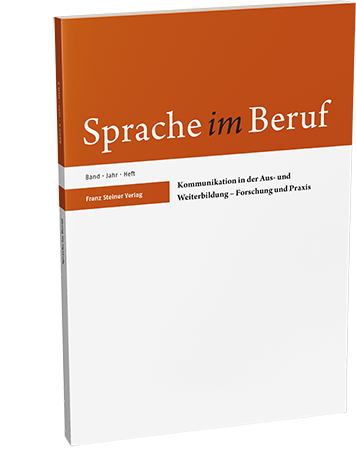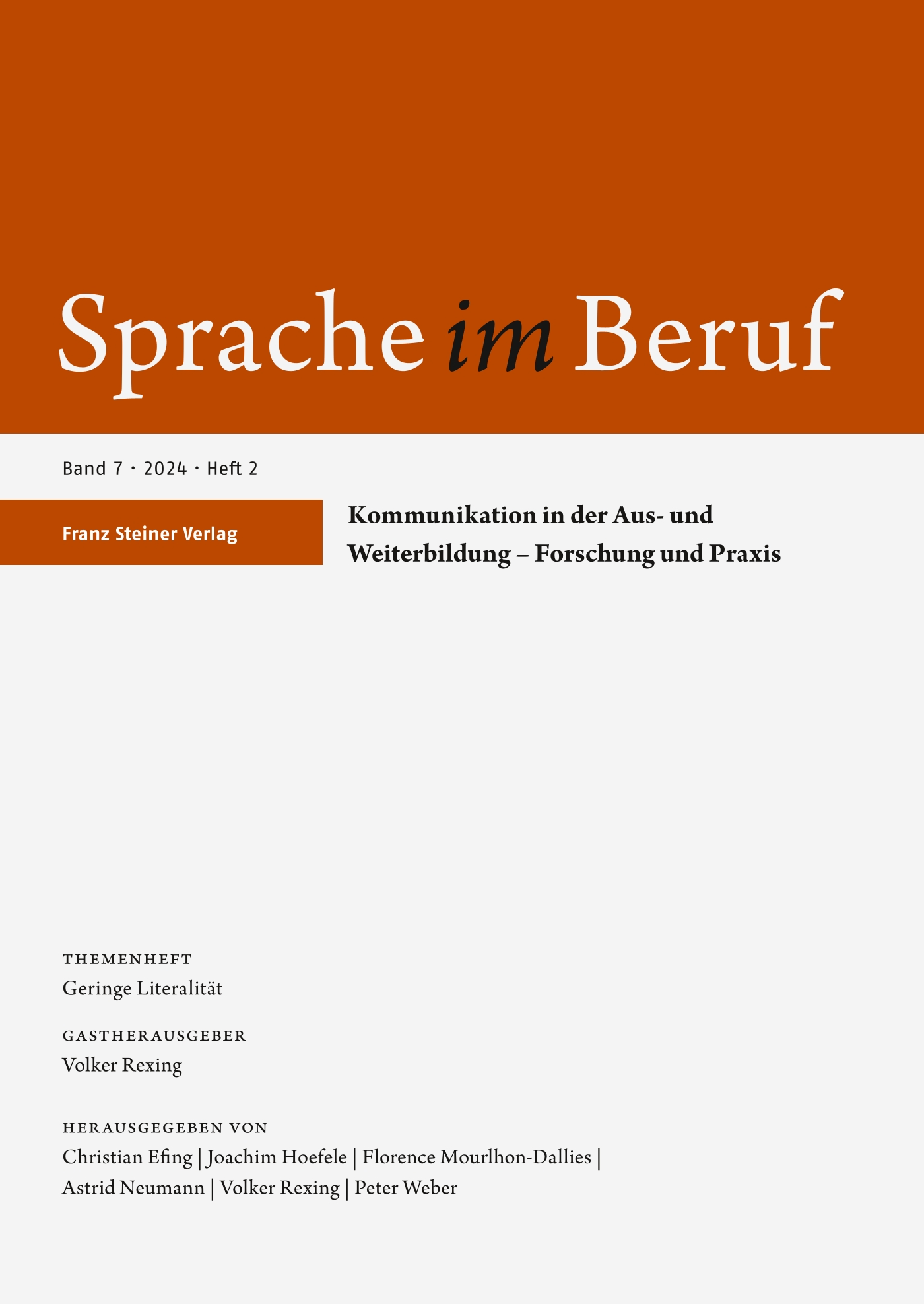
Sprache im Beruf
Kommunikation in der Aus- und Weiterbildung – Forschung und Praxis
Sprache im Beruf (SpriB) focuses on the role and function of, as well as the requirements for, communicative skills in the job-training domain. The editors take for granted the increased significance of research that probes the interface of language/communication and job (training) contexts. Competences of this kind answer to current issues of labour migration and the concomitant increase of people seeking professional and social integration through, with and in a (second) language in particular.
The journal addresses both academics and professionals concerned with workplace literacy: language didacticists, applied linguists, expert form vocational and economic education studies, practitioners engaged in (advanced) vocational training, or human resource developers. Publications can be submitted in German, English, or French.
> journal overview | > latest issues on our elibrary
Edited by
Prof. Dr. Christian Efing
(editor-in-chief)
RWTH Aachen UniversityInstitut für Sprach- und Kommunikationswissenschaft
Eilfschornsteinstr. 15
52062 Aachen
DEUTSCHLAND c.efing@isk.rwth-aachen.de
Editors
Prof. Dr. Christian Efing (Bergische Universität Wuppertal)
Prof. Dr. Joachim Hoefele (ZHAW Winterthur)
Prof. Dr. Florence Mourlhon-Dallies (Université Paris)
Prof. Dr. Astrid Neumann (Universität Lüneburg)
Prof. Dr. Volker Rexing (RWTH Aachen)
Dr. Peter Weber (Universität zu Köln)
Advisory board
Prof. Dr. Hervé Adami (Université Lorraine)
Prof. Dr. Laurent Filliettaz (Université de Genève)
Prof. Dr. Eva-Maria Jakobs (RWTH Aachen)
Prof. Dr. Triantafyllia Liana Konstantinidou (ZHAW Winterthur)
Prof. Dr. Constanze Niederhaus (Universität Paderborn)
Prof. Dr. Ulrich Nill (Universität Stuttgart)
Prof. Dr. Maik Philipp (PH Zürich)
Dr. habil. Pawel Szerszen (Uniwersytet Warszawski)
Prof. Dr. Thorsten Roelcke (TU Berlin)
Prof. Dr. Birgit Ziegler (TU Darmstadt)
Sprache im Beruf
General information
ISSN 2569-1112 (print)
ISSN 2625-4360 (online)
Founded: 2018
Publication frequency: biannual
Size: 17 x 24 cm
Annual number of pages: ca. 256
Languages: English, French, German
Review section: Yes
Validation: peer review
VET Repository
Google Scholar
Ulrichs web
Publishing information
Please send manuscript submissions to the editor-in-chief. Submissions must be original articles (no translations) which must not be previously published. During the review process, manuscripts may not be submitted elsewhere. A manuscript submitted to the journal must be ready for publication, the editors do not accept partial or draft versions. In initial submissions, the citation rules of the journal do not have to be strictly followed. Please pay attention to the anonymization of your text so that your identity as author cannot be ascertained directly or indirectly (e.g. by acknowledgments and self-references in footnotes).
All submissions are subjected to peer review. The review process can result in acceptance, the recommendation of revisions or rejection of the manuscript. The author is informed of the decision by email. The editors attempt to reach a decision within 3 months of the submission of the manuscript.
If a manuscript is accepted, the editors request a file with the final version. The final version includes names and acknowledgments. Also, please follow the guidelines of publisher and editors provided below.
There are no fees for submitting and publishing an article in the journal.
For information on manuscript preparation and the citation guidelines for Sprache im Beruf please check our authors’ area:
Please see our information on copyright, self-archiving rules and guidelines for the use of PDF reprints here:
For our publication ethics statement have a look here:
Discover the journal
Subscribe
For institutions: Do you wish to subscribe to Sprache im Beruf? Please get in contact with us and write to us here:
For private customers:
The journal
-
€174.00*
-
€118.00*
-
€118.00*
